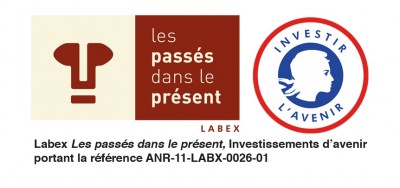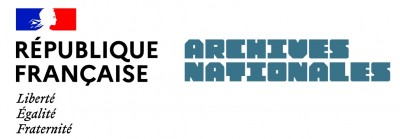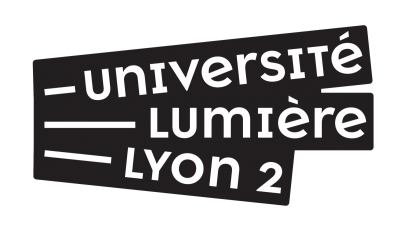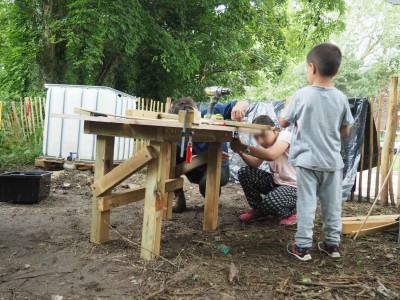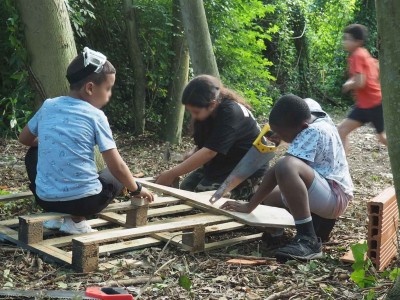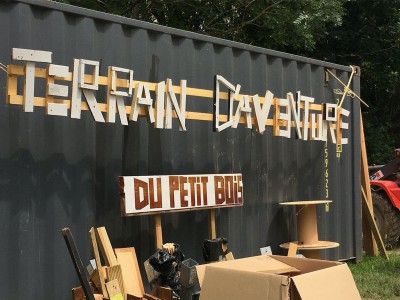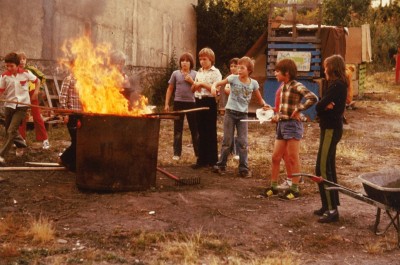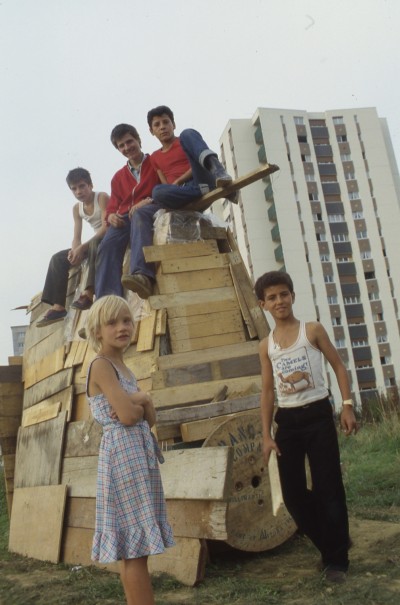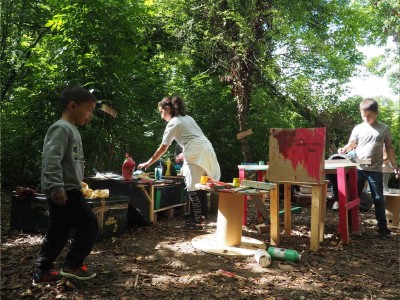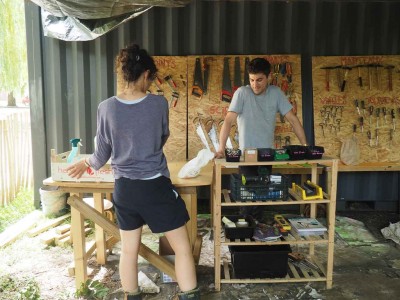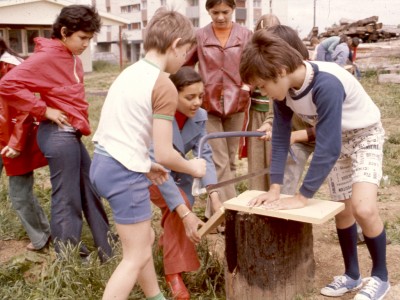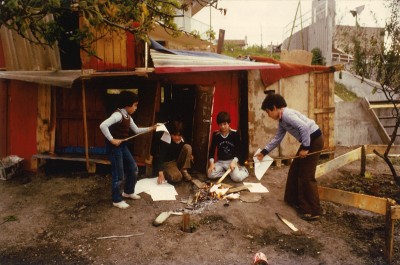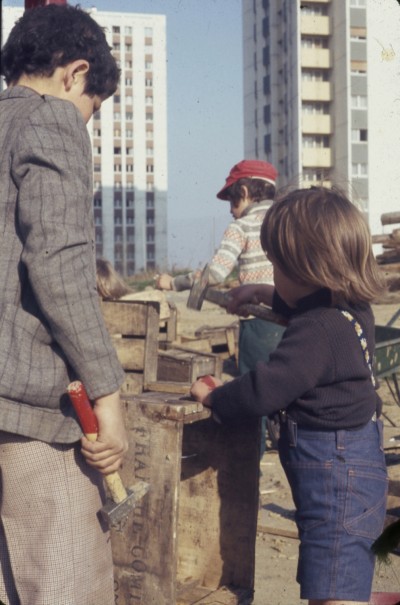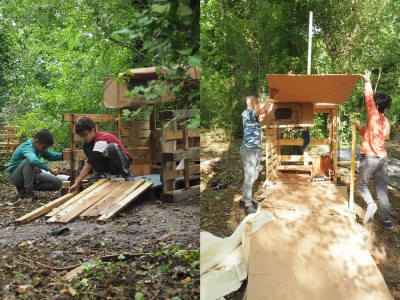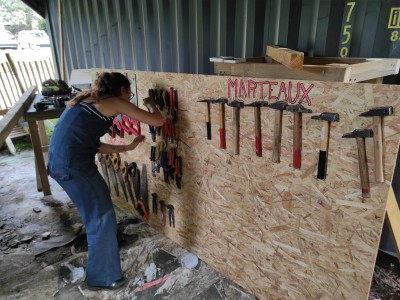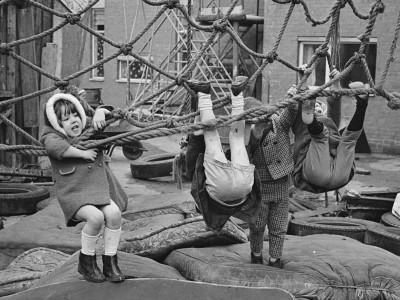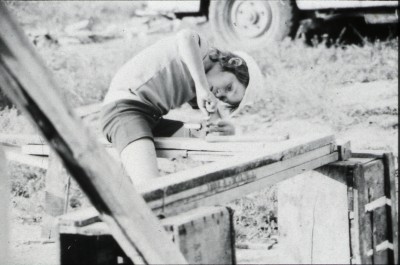Experimenting with an adventure playground for the very young in Villiers-le-Bel
JULY 2021
REINVENTING ADVENTURE PLAYGROUNDS IN ÎLE-DE-FRANCE
Experimenting with a new adventure playground for the very young in Villiers-le-Bel
July 5–31, 2021, free admission from 3 p.m. to 8 p.m.
TAPLA was selected as a winner of the FAIRE cohort of December 2020. This summer, the TAPLA team is setting up an adventure playground in Villiers-le-Bel, in partnership with CEMEA Île-de-France. This inaugural experiment aims to demonstrate the value and feasibility of open playgrounds where children from the neighborhood can freely come to play, run, build a hut, hammer nails, tend to a garden, dig a hole, cut wood, observe plants or insects, climb trees, meet friends, create a fantasy world, or simply do nothing at all.
These spaces gradually disappeared due to the impact of overbearing and overprotective health and safety regulations and standards. Yet, they help reconsider the way people live together in public spaces as well as the place of children in the city.
An adventure playground is the polar opposite of a playground set up by adults for children. It is a place where the children themselves build their play space through play. It is a space that is under permanent construction. In an adventure playground, children and adolescents learn to adapt to their environment and assess dangers, as well as look out for themselves and others. Adventure playgrounds are located at the nexus of various issues facing our society. They are collective facilities built by users from recovered materials, and therefore serve as places of learning and promoting reuse. Moreover, in line with temporary urbanism, these facilities are reversible and inexpensive.
Located between the field of the Champ des Possibles and the local allotment gardens, the adventure playground of Villiers-le-Bel will be open from July 5 to July 30, every day, from Monday to Saturday, from 3 p.m. to 8 p.m. The team of facilitators will undertake to secure the playing environment and provide free and unconditional welcome to all children there, regardless of their age, gender, financial means, or status. Children come and go as they please, and play is free.
This experiment aims to form a network of local actors, play officers, designers, and researchers to structure the contemporary movement of adventure playgrounds, in Île-de-France and beyond.
THE ORIGINS OF THE TAPLA PROJECT
"Adventure playgrounds are a solution hailing from the past that came about during the social and humanitarian crisis of the Second World War. Though they have now all but disappeared in France, we believe they could offer an appropriate response to current sanitary, safety and environmental challenges.
These are spaces for free play where children are not only users but also builders. They are the polar opposites of safe and sanitized play areas as they invite us to acknowledge free play and to engage in it as a way of thinking and designing space in an urban environment. Children are directly confronted with matter and living things, will bump into one another and sometimes fall. They will get to learn that their surroundings can be dangerous and as a result to adapt, to assess risks, to pay attention to themselves and to others.
The assumption underlying the TAPLA project is that we can put to use these educational and urban experiments from the past to invent modern resilient planning methods that will allow us to think differently about the place of children in the city.
TAPLA aims to update this model from the past to the contemporary context. We have gathered a cross-disciplinary team bringing together archivists, researchers in human and social sciences as well as urban practitioners.
TAPLA aims to develop a network of experimental adventure playgrounds in the Île-de-France metropolis. To achieve this vision, we have joined forces with CEMéA Île-de-France, which is an expert in the development of active education methods and has the capacity to train an entire cohort of facilitators for these playgrounds.” - Aurélien Ramos and Gilles Raveneau
REINVENTING ADVENTURE PLAYGROUNDS IN ÎLE-DE-FRANCE
Experimenting with a new adventure playground for the very young in Villiers-le-Bel
July 5–31, 2021, free admission from 3 p.m. to 8 p.m.
TAPLA was selected as a winner of the FAIRE cohort of December 2020. This summer, the TAPLA team is setting up an adventure playground in Villiers-le-Bel, in partnership with CEMEA Île-de-France. This inaugural experiment aims to demonstrate the value and feasibility of open playgrounds where children from the neighborhood can freely come to play, run, build a hut, hammer nails, tend to a garden, dig a hole, cut wood, observe plants or insects, climb trees, meet friends, create a fantasy world, or simply do nothing at all.
These spaces gradually disappeared due to the impact of overbearing and overprotective health and safety regulations and standards. Yet, they help reconsider the way people live together in public spaces as well as the place of children in the city.
An adventure playground is the polar opposite of a playground set up by adults for children. It is a place where the children themselves build their play space through play. It is a space that is under permanent construction. In an adventure playground, children and adolescents learn to adapt to their environment and assess dangers, as well as look out for themselves and others. Adventure playgrounds are located at the nexus of various issues facing our society. They are collective facilities built by users from recovered materials, and therefore serve as places of learning and promoting reuse. Moreover, in line with temporary urbanism, these facilities are reversible and inexpensive.
Located between the field of the Champ des Possibles and the local allotment gardens, the adventure playground of Villiers-le-Bel will be open from July 5 to July 30, every day, from Monday to Saturday, from 3 p.m. to 8 p.m. The team of facilitators will undertake to secure the playing environment and provide free and unconditional welcome to all children there, regardless of their age, gender, financial means, or status. Children come and go as they please, and play is free.
This experiment aims to form a network of local actors, play officers, designers, and researchers to structure the contemporary movement of adventure playgrounds, in Île-de-France and beyond.
THE ORIGINS OF THE TAPLA PROJECT
"Adventure playgrounds are a solution hailing from the past that came about during the social and humanitarian crisis of the Second World War. Though they have now all but disappeared in France, we believe they could offer an appropriate response to current sanitary, safety and environmental challenges.
These are spaces for free play where children are not only users but also builders. They are the polar opposites of safe and sanitized play areas as they invite us to acknowledge free play and to engage in it as a way of thinking and designing space in an urban environment. Children are directly confronted with matter and living things, will bump into one another and sometimes fall. They will get to learn that their surroundings can be dangerous and as a result to adapt, to assess risks, to pay attention to themselves and to others.
The assumption underlying the TAPLA project is that we can put to use these educational and urban experiments from the past to invent modern resilient planning methods that will allow us to think differently about the place of children in the city.
TAPLA aims to update this model from the past to the contemporary context. We have gathered a cross-disciplinary team bringing together archivists, researchers in human and social sciences as well as urban practitioners.
TAPLA aims to develop a network of experimental adventure playgrounds in the Île-de-France metropolis. To achieve this vision, we have joined forces with CEMéA Île-de-France, which is an expert in the development of active education methods and has the capacity to train an entire cohort of facilitators for these playgrounds.” - Aurélien Ramos and Gilles Raveneau
PROJECT PARTICIPANTS
TAPLATAPLA (Terrains d’aventure du passé pour l’avenir—literally “Adventure Playgrounds from the Past for the Future”) is a research-action project supported by the academic cluster, Labex “Les passés dans le présent” [Pasts in the Present], initiated by the French National Archives and Université Paris Nanterre. It brings together a multidisciplinary team of archivists, researchers in the humanities and social science, architects, landscapers, and urban planners.
Learn more at tapla.hypotheses.org and passes-present.eu
Ceméa Île-de-France
CEMÉAs are nonprofit community organizations involved in progressive education and training. They focus their approach on continuous interaction between the individual and the group, the environment, and the living environment. CEMÉAs are public interest organizations that are officially recognized by various major government ministries in France, including the Ministry for National Education and Youth, the Ministry of Solidarity and Health, the Ministry of Culture, the Ministry for Europe and Foreign Affairs, and the Ministry of the Overseas.
Villiers-le-BelVilliers-le-Bel is a French municipality located at the southeastern end of Val-d’Oise in the Île-de-France region, fourteen kilometers north of Paris. It is the seat of the canton of Villiers-le-Bel.
TAPLATAPLA (Terrains d’aventure du passé pour l’avenir—literally “Adventure Playgrounds from the Past for the Future”) is a research-action project supported by the academic cluster, Labex “Les passés dans le présent” [Pasts in the Present], initiated by the French National Archives and Université Paris Nanterre. It brings together a multidisciplinary team of archivists, researchers in the humanities and social science, architects, landscapers, and urban planners.
Learn more at tapla.hypotheses.org and passes-present.eu
Ceméa Île-de-France
CEMÉAs are nonprofit community organizations involved in progressive education and training. They focus their approach on continuous interaction between the individual and the group, the environment, and the living environment. CEMÉAs are public interest organizations that are officially recognized by various major government ministries in France, including the Ministry for National Education and Youth, the Ministry of Solidarity and Health, the Ministry of Culture, the Ministry for Europe and Foreign Affairs, and the Ministry of the Overseas.
Villiers-le-BelVilliers-le-Bel is a French municipality located at the southeastern end of Val-d’Oise in the Île-de-France region, fourteen kilometers north of Paris. It is the seat of the canton of Villiers-le-Bel.




